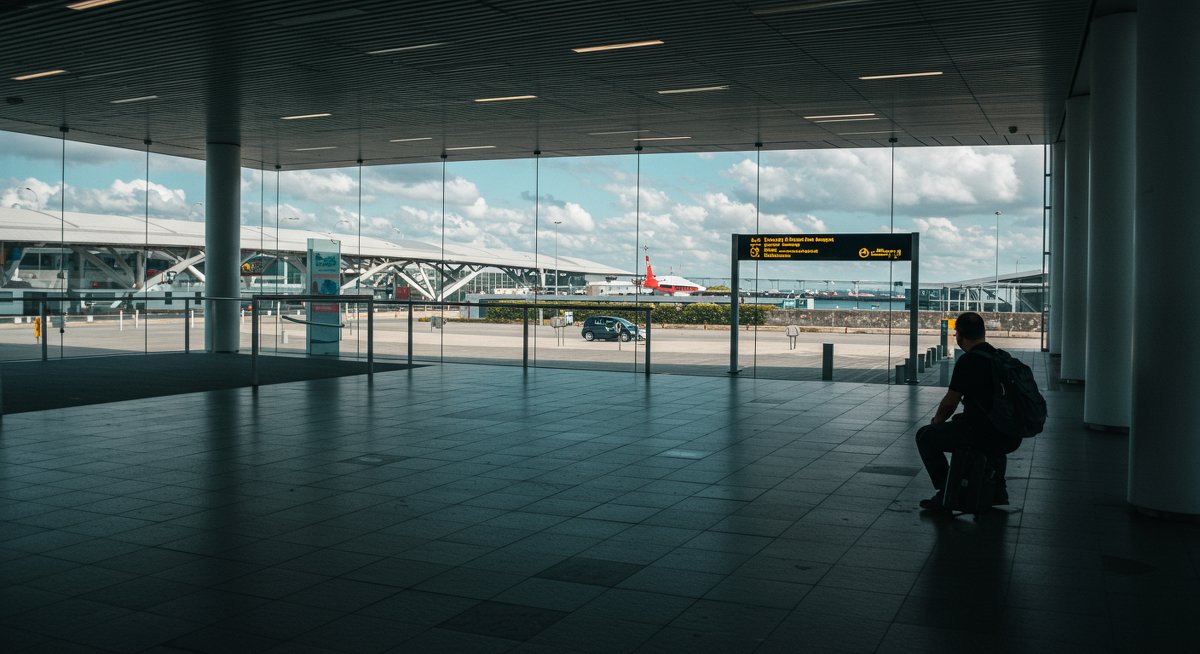Lost luggage is a nightmare for any traveler. If you're facing this frustrating situation in Europe, you're not alone. Each year, thousands of bags go missing, causing stress and disrupting travel plans. But, take a deep breath. This isn't the end of your trip! This guide provides a clear, actionable plan to help you recover your luggage and navigate the process of seeking compensation, while understanding your rights as an international traveler.

The problem: What's really happening
Losing your luggage can be incredibly upsetting. You're separated from your essential items, your travel plans are thrown into disarray, and you're left with uncertainty. But what happens when a bag goes missing?
First, the airline's baggage handling system likely failed. This might be due to a missed connection, a labeling error, or a simple human mistake during the loading and unloading of the aircraft. Sometimes, bags are loaded onto the wrong flight. Other times, they're simply left behind. Regardless of the cause, the initial minutes and hours after realizing your bag is missing are critical. Quick action increases the chances of recovery. Airlines are not always the most efficient at handling these situations. Their systems, while improving, still have vulnerabilities. But knowing how the system works is the first step in solving the problem.
Example 1: Imagine you've just landed in Paris, excited for your trip, only to discover your checked bag is nowhere to be found. You've lost your medication, your only pair of comfortable shoes, and all the clothes you packed for your week-long adventure. This is a classic scenario. The initial panic sets in.
Example 2: You're connecting through Frankfurt, and a tight connection leads to your luggage not making the transfer. You arrive at your final destination in Italy, but your bag is missing. This is when you need to know exactly what to do to start the recovery process.
Example 3: In the worst-case scenario, you've arrived at your destination, and your bag has been lost for several days. Perhaps it was misrouted to the wrong country, or it's simply stuck in a backlog. This is where knowing your rights becomes essential, and understanding the compensation process is key.
Common mistakes
- Not reporting the missing luggage immediately: Time is of the essence. Report the loss before leaving the airport.
- Failing to get a Property Irregularity Report (PIR): This is your essential document for filing a claim.
- Not documenting the contents of your bag: Take photos of your luggage and its contents before you travel.
Expert tip
Pack essential items (medication, a change of clothes, and toiletries) in your carry-on bag. This way, if your checked luggage is delayed or lost, you'll have what you need. Also, consider using luggage trackers.
Why this affects international travelers
Lost luggage poses unique challenges for international travelers. You're often far from home, navigating a foreign language, and potentially dealing with unfamiliar legal systems. The added stress of being without your belongings can significantly impact your travel experience. Plus, you may be without essential items needed for your trip, and the cost of replacing those items can quickly add up, impacting your travel budget. Moreover, international travel often involves connecting flights, increasing the chances of mishandled baggage. Differences in airline policies, compensation regulations, and even the availability of assistance can vary widely across European countries. This can be incredibly confusing.
The ripple effect
Beyond the immediate inconvenience, lost luggage can lead to:
- Financial losses: Replacing lost items.
- Missed opportunities: If your luggage contains essential items for a planned activity.
- Emotional distress: The frustration and anxiety of being separated from your belongings.
Actionable steps to follow:
- Report the Loss Immediately: Go to the airline's baggage claim desk or customer service counter immediately after you realize your luggage is missing.
- Fill Out the Property Irregularity Report (PIR): This is your official document. Provide as much detail as possible about your luggage (color, size, any unique features). Get a copy for your records and keep the reference number.
- Document Everything: Keep records of all communications with the airline, including dates, times, and names of the people you spoke with. This will be essential if you need to file a claim.
Example 1: You're in Barcelona, and your luggage is lost. Because you're unfamiliar with the local language and regulations, you feel disoriented. By immediately following this Action Plan and understanding your rights, you are much better prepared to solve the issue.
Example 2: You have a connecting flight in Amsterdam. Due to the tight transfer time, your luggage does not make the connection. After arriving in your destination city, you take the necessary steps as outlined in this guide.
Example 3: You've lost your luggage on a multi-city European trip. Your bag contains vital documents. Implementing this guide will significantly reduce the hassle and make recovery more effective.
Root causes analysis
Understanding why luggage gets lost can help you prevent it from happening. Common factors include:
- Tight connection times: Increasing the chance of baggage not being transferred.
- Human error: Mislabeling or improper handling by airport staff.
- Technical issues: Problems with baggage handling systems.
- Inadequate staffing: Understaffed baggage departments during peak travel seasons.
- Extreme weather: Disrupting flight schedules and baggage handling.
Prevention strategies
- Use sturdy luggage: Invest in durable bags.
- Remove old tags: Prevent confusion.
- Check your bag's destination tag: Confirm it matches your final destination.
- Consider luggage trackers: Give yourself peace of mind.

Step-by-step solution framework
Here's your detailed action plan to recover your lost luggage:
- Report the Loss Immediately: Locate the airline's baggage claim desk or customer service counter at the airport. Inform them that your luggage is missing.
- File a PIR (Property Irregularity Report): Complete the PIR form, providing as much detail as possible about your luggage (color, size, brand, unique features). The airline will give you a reference number.
- Gather Documentation: Collect all your travel documents, including your boarding pass, baggage tags, and any receipts for essential items you had to purchase due to the lost luggage.
- Contact the Airline Regularly: Follow up with the airline daily (or as instructed). Keep records of your communications, including the names of the people you spoke with, dates, and times.
- Track Your Luggage: If the airline provides an online tracking system, use it to monitor the status of your luggage.
- File a Formal Claim: If your luggage is not recovered within a reasonable time (usually 21 days), file a formal claim for compensation. This must be done in writing and include all supporting documentation (PIR, receipts, etc.).
- Understand Your Rights: Know your rights regarding compensation.
- Seek Professional Help (If Needed): If the airline is unresponsive or the compensation offered is insufficient, consider seeking help from a consumer protection agency or a legal professional specializing in air passenger rights.
Practical tips
- Take photos: Before you travel, take photos of the contents of your luggage.
- Keep receipts: Keep all receipts for items purchased.
- Know your rights: Research airline compensation policies.
Example 1: You followed the above steps after your luggage went missing in Rome. You filed the PIR, contacted the airline daily, and tracked the status of your luggage online.
Example 2: After your luggage was lost in Berlin, you contacted the airline regularly, but the airline offered insufficient compensation. You researched your rights, and then you escalated the claim with the airline.
Example 3: You implemented the step-by-step action plan after your luggage was lost in Madrid. Using this information, you successfully recovered your luggage within a few days, avoiding a potentially stressful situation.
Prevention strategies
Preventing lost luggage is the best way to avoid the stress and inconvenience. Here are some proactive steps you can take:
- Use Durable Luggage: Invest in sturdy, high-quality luggage that can withstand the rigors of travel.
- Apply luggage trackers: Consider using Bluetooth trackers or GPS trackers to monitor the location of your luggage.
- Remove Old Tags: Before each trip, remove any old baggage tags from previous flights.
- Check Your Bag Tag: Always double-check that the baggage tag attached to your luggage is correct and includes the correct destination airport code.
- Consider Travel Insurance: Travel insurance with lost luggage coverage can provide financial protection.
- Pack Strategically: Keep essential items (medication, a change of clothes, toiletries) in your carry-on bag.
- Arrive Early: Arriving early at the airport can help ensure that you have enough time for check-in and baggage handling.
Common pitfalls
- Waiting too long to report the loss: Report the loss immediately.
- Not keeping detailed records: Document all communication.
- Not knowing your rights: Research airline compensation policies.
When to seek professional help
Sometimes, despite your best efforts, you may need to seek external assistance. Here's when it's time to consider professional help:
- Unresponsive Airline: If the airline is unresponsive or fails to provide updates.
- Insufficient Compensation: If the airline's compensation offer is inadequate.
- Legal Disputes: If you need to take legal action to recover your losses.
- Complex Cases: If the case involves multiple airlines or international regulations.
Consider contacting consumer protection agencies, legal professionals, or travel insurance providers.
Examples
- Example 1: The airline is unresponsive to your inquiries. You decide to seek help from a consumer protection agency specializing in air passenger rights.
- Example 2: The airline is offering insufficient compensation. You contact a legal professional.
- Example 3: You are dealing with multiple airlines, making the recovery process too complicated. You contact a legal professional for help.
International legal protections
International laws and conventions protect air passengers' rights.
- The Montreal Convention: This international treaty governs airline liability for lost, delayed, or damaged baggage.
- EU Regulation 261/2004: This regulation outlines passenger rights in the event of flight disruptions, including lost luggage.
Key rights
- Compensation: Airlines are generally liable for lost luggage.
- Reimbursement: You may be entitled to reimbursement for the cost of essential items purchased while your luggage is missing.
- Time Limits: There are deadlines for filing claims.
EU regulations
Under EU law, you may be entitled to up to approximately €1,400 (USD $1,500) in compensation for lost luggage, depending on the value of the contents. However, airlines often have their own internal policies, so it's important to understand these.
Example: After your luggage is lost in Amsterdam, you learn about your rights under the Montreal Convention and EU Regulation 261/2004.
Your action checklist
Use this checklist to guide you through the process of recovering your lost luggage in Europe.
- Report the Loss Immediately: File a PIR with the airline.
- Gather Documentation: Collect all relevant documents.
- Contact the Airline: Follow up regularly.
- Track Your Luggage: Use online tracking systems if available.
- File a Formal Claim: Submit a written claim.
- Know Your Rights: Understand your compensation rights.
- Seek Professional Help (If Needed): Consider external assistance.
Next steps in your travel journey
Losing your luggage is a stressful experience, but by following this action plan, you can improve your chances of a successful recovery. Remember to always take proactive steps to prevent luggage loss. With a bit of persistence and the right knowledge, you can navigate this challenge and get back to enjoying your travels in Europe.
If you're facing this issue too, remember the tips mentioned in this guide. Safe travels!